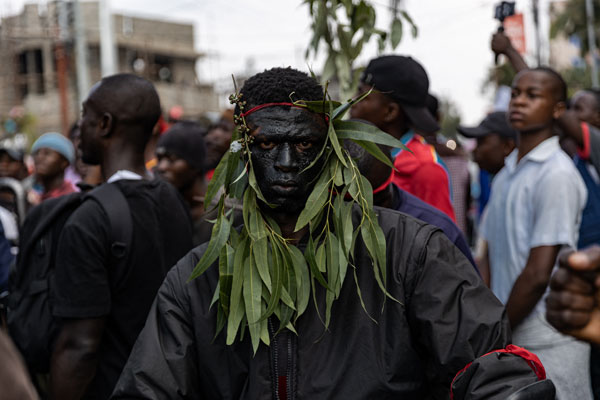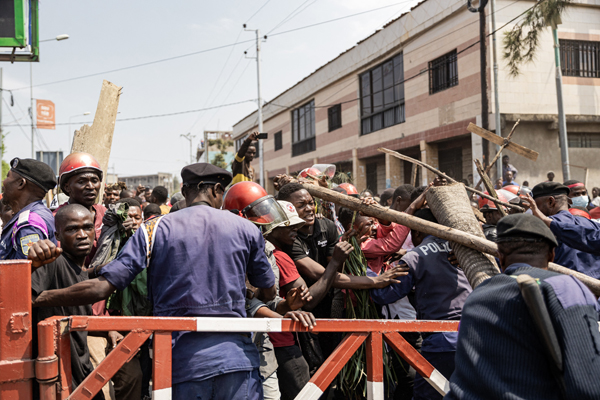Prime
Fraught ties between DR Congo and Rwanda date back decades

Demonstrators try to reach the border between Democratic Republic of Congo and Rwanda during a protest in Goma on June 15, 2022. PHOTO / AFP
What you need to know:
- In late 2013, in Nairobi, the M23 and Kinshasa signed an accord that included provisions allowing former rebels to be incorporated into the military to reintegrate into civilian life.
The Democratic Republic of Congo and its smaller eastern neighbour Rwanda are at loggerheads over a rebel group blamed for bloody attacks in eastern DRC.
The row has seen the DRC accusing Rwanda of supporting the M23 group, an allegation Rwanda denies.
Here is a backgrounder on the quarrel, whose roots are decades old:
Migration and genocide
During the Belgian colonial era, thousands of Rwandan farmers moved into the fertile hills of Congo's Kivu region, sowing the seeds for rwandophone communities variously known as the "Banyarwanda," "Banyamulenge" or "Banyabwisha."
Further crises in Rwanda and Burundi spurred further waves of migrants into the Congo, and eventually self-defence groups formed as ethnic Rwandans came under pressure on the western side of the border.
The 1994 genocide in Rwanda became a turning point.
More than a million Rwandan Hutus fled into Congo. Many of them were troops or militiamen who had taken part in the bloodletting, which claimed the lives of some 800,000 people, mostly members of the Tutsi minority as well as moderate Hutus.
The influx became a major source of friction. Rwanda's post-genocide regime, led by the country's current president Paul Kagame, accused armed groups of launching attacks on its territory.
Regional wars
In 1996, Uganda and Rwanda supported a rebel campaign against the army of Congolese dictator Mobutu Sese Seko, who was overthrown the following year by a coalition led by opposition leader Laurent-Desire Kabila.
But relations between Kabila and his former allies swiftly broke down.
In 1998, a new Rwandan-backed rebellion broke out in Kivu, eventually sucking in other countries around the region and dozens of armed groups.
The conflict was essentially over control of the region's mineral wealth, which in 2000 even prompted a violent confrontation between Rwanda and Uganda over the mining town of Kisangani.
In 2002, Rwanda and the DRC signed a peace agreement, but relations have been marked ever since by suspicion and mutual accusations of cross-border meddling through rebel groups.
CNDP
In 2004, an rebellion broke out in South Kivu province and then spread to North Kivu led by two former army officers. The Kinshasa government accused Rwanda of backing them, a charge it denied.
Two years later, one of the rebel leaders, Laurent Nkunda, launched his own militia, the National Congress for the Defence of the People (CNDP), which again the DRC said was backed by Kigali.
But in 2009, in a remarkable but brief about-turn in relations, Rwandan troops entered the DRC with Kinshasa's blessing to conduct an operation against a Rwandan Hutu rebel group, the Democratic Forces for the Liberation of Rwanda (FDLR).
Nkunda was arrested during this operation.
M23
In 2012, a new rebel group emerged among Congolese Tutsi rebels, led by former CNDP members who had been incorporated into the DRC army under a peace deal signed on March 23, 2009.
They used that date as the inspiration for their name -- "the March 23 Movement," or M23. According to a UN report, the M23 was backed by Rwanda.
In November 2012, the group briefly seized DR Congo's eastern city of Goma.
But a year later, the group was defeated and forced out of the country by a joint UN and Congolese army offensive.
In late 2013, in Nairobi, the M23 and Kinshasa signed an accord that included provisions allowing former rebels to be incorporated into the military to reintegrate into civilian life.
But the M23 became aggrieved at what it said was Kinshasa's failure to implement the deal.
The group made an armed comeback last November. Violence escalated in North Kivu in late March, prompting thousands of people to flee.
The DRC accuses Rwanda of supporting, funding and arming the rebels. Rwanda denies the charge, and instead accuses the DRC army of backing the FDLR.





